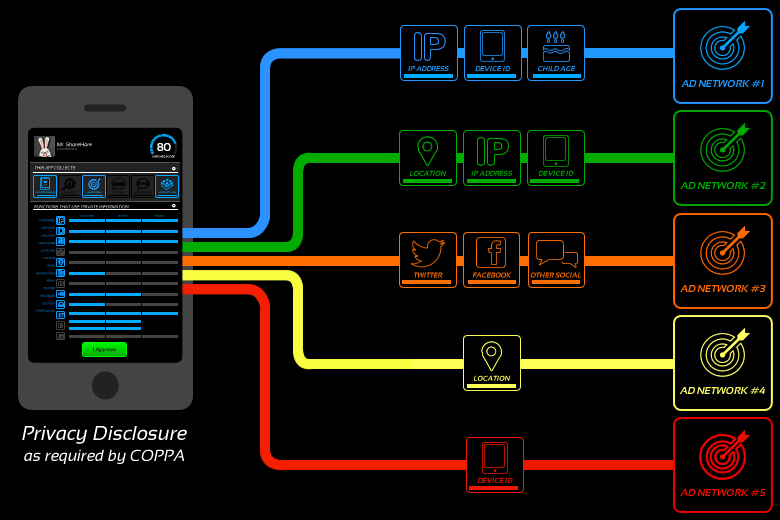The feds are set to begin slapping app developers and mobile game companies with hefty fines for violating the Children’s Online Privacy Protection Act starting any day.
And software startup AgeCheq’s software solution will help protect third parties such as advertisers, gaming outfits, and others from the most inconvenient of federal overtures: stiff penalties — or even putting you out of business. The feds have the power, but AgeCheq says its tools will help companies properly safeguard the types of information apps and virtual games are collecting and storing about kids 13 and under, according to AgeCheq chief executive Roy Smith.
“It’s a very complex problem. What we are doing is providing the entire online ad networks and their world a way to be compliant with COPPA 2.0. It addresses the whole part of COPPA: helping mom know what information gaming companies are collecting on their kids,” Smith told VentureBeat from his home near Lancaster, Penn., on Tuesday.
The feds describe COPPA 2.0 in detail here.
Beginning today, AgeCheq opened its software platform and data bases to third parties — mobile ad networks and others — in order to help with COPPA compliance.
AgeCheq put it this way: “As you are aware, mobile apps and games that feature advertising are one of the key groups on the hook for COPPA. No mobile ad network wants their customer to be fined for failing to comply with COPPA, so ad networks and other third-party services need to do all they can to make it easy for their customers to comply with the law.”
Several attorneys who work with online gaming outfits confirmed to VentureBeat that, at least this time around, the feds are serious about enforcing the laws. You can read more about this in the coming days.
It comes down to some in the industry selling, improperly storing, or even trading informational data collected about children using apps and games. With the feds set to bring the hammer down, the move has broad implications for the mobile space.
Ad networks and mobile gaming companies, for example, can log in here for a free account and imput information they capture when serving ads. According to Smith:
“When their customer goes in to set-up their app with AgeCheq, the advertiser would check mark that they use the ad network, and that ad network’s info will be automatically populated based on what they shared with AgeCheq. Without a service like this the advertiser would have to call up the ad network and gather all of this disclosure info by hand, over and over, for each ad network they use.”
Congress passed COPPA in 1998 to protect children from online predators and protect marketing firms from selling information about kids’ Internet use and personal details to third-party data firms. When children log in to game sites and download apps, the information they give is, by law, supposed to remain safe with the companies they’re interacting with.
The feds tweaked COPPA last year, and many people referred to the change as COPPA 2.0. The revision gave players in the sector a grace period to adapt and suss out the federal guidelines in the rapidly changing mobile industry or face the FTC’s wrath.
That period is over, and the feds are set to begin cracking down on violators, as VentureBeat reported exclusively. Fines will be up to $16,000 per COPPA violation. Or $16,000 for each app download or log-in that violated COPPA.
A recent FTC warning, posted on their website, put it this way:
“Most apps fail to provide any information about the data collected through the app, let alone the type of data collected, the purpose of the collection, and who would obtain access to the data. Even more troubling, the results (of the study) showed that many of the apps shared certain information – such as device ID, geolocation, or phone number – with third parties without disclosing that fact to parents.”
“AgeCheq fulfills a need in the industry to help with COPPA compliance. There is minimal effort here and no cost,” Smith said. He pointed out that mobile ad networks and other API service providers can use AgeCheq to also automate the creation of privacy disclosure statements.
“If kids want to use an app, the law says mom has to look at the app what the data is being used for. This gives mom the ability to see the information that app is collecting about their children and also what the (federal) law says about it,” Smith said.
The feds are coming.
VentureBeat's mission is to be a digital town square for technical decision-makers to gain knowledge about transformative enterprise technology and transact. Learn More


